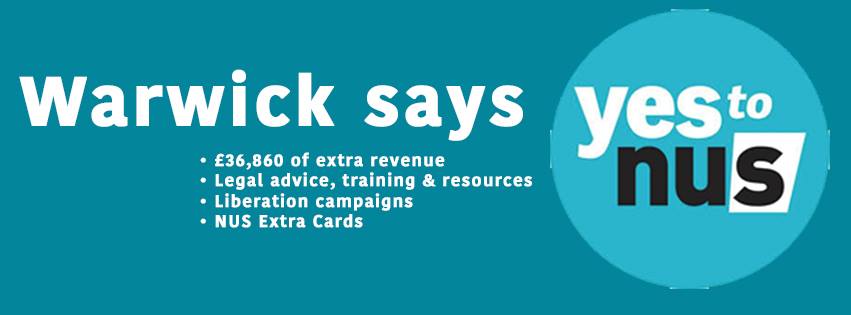Be selfless and stay affiliated – Yes to NUS
Warwick SU’s mission statement is centred around making the student experience better for all students during their time at university – in whatever way that may be. Can we truly say that the experience of every student at Warwick would be ‘better’ if we were to disaffiliate from the National Union of Students? I certainly cannot – especially where marginalised groups are concerned. In fact, I’d argue we’d be much worse off.
Liberation groups in the NUS are often berated – mocked for the use of ‘jazz hands’ to meet accessibility needs, or reduced to a faction full of vicious infighting and supposed sensitivity that would make us crumble if we were to spend five minutes in the ‘real world’. While the student movement could indeed make a greater effort to promote diplomacy over struggle at times, it’s a bit rich for opponents of the NUS to reduce us all to a divided and inefficient group of ‘lefties’, when what they seek to do with disaffiliation is just that: divide us and make us inefficient. Weak unions make for weak opposition to damaging behaviour from universities and governments alike.
Disaffiliation – just as we have elected the first black Muslim woman President and voted to set up an autonomous Trans Campaign, no less – is destabilising. Disaffiliation means huge financial losses and risks for our Students’ Union, which means that liberation campaigns will likely be among the first areas to suffer. If we have no national campaign representing us and our budgets get cut in our own Union due to financial restraints, we are left voiceless.
Weak unions make for weak opposition to damaging behaviour from universities and governments alike.
Disaffiliation campaigns present themselves as coming from a place of democratic principle and representation. The rallying cry of “The NUS doesn’t represent me because I’m an ordinary student” has been hurled around left, right and centre. Firstly, don’t do yourself the injustice of calling yourself an “ordinary” student.
The ordinary student does not exist. It is a fallacy to refer to anybody as ‘normal’ – and a dangerous one at that. Whatever our interests or priorities, we are extraordinary students – we are musicians, athletes, activists, badass researchers and so much more.
Disaffiliation campaigns present themselves as coming from a place of democratic principle and representation.
But we also have our nuances, our intersections, and our differences. We are women, people of colour, LGBTUA+ students, people with disabilities, part-time students, mature students, international students, Jewish students, Muslim students, people of faith, and carers – and we are most effective when working as a collective.
The NUS is working on consent education, on liberating curriculums to include more women and people of colour in our courses, on disabled student allowance cuts, on fighting the Prevent agenda – and on countless other vital campaigns that offer a lifeline to many students, even if they might not necessarily apply to one individual.
It is a fallacy to refer to anybody as ‘normal’ – and a dangerous one at that.
Even if you feel that none of the above applies to you, you will no doubt have a friend, a classmate or a housemate who will benefit from NUS affiliation in some tangible way. The campaign to stay in the NUS is a selfless one as much as it is inherently selfish for many.
Selfishly, we will be weighing up the ‘mainstream’ issues at stake: price rises in SU outlets, diminished effectiveness of our Sabbatical Officer team, and cuts to society funding that will likely affect us all. However, if the more marginalised campaigns noted above don’t apply to you as one individual, surely we can also be mature and empathetic enough to appreciate the value these campaigns have on those around us, and not diminish their importance.
The campaign to stay in the NUS is a selfless one as much as it is inherently selfish for many.
In this way, it feels disingenuous to repeatedly ask “Does the NUS represent you?” in a disaffiliation campaign. Remember, this is the organisation that created the Student Railcard, secured Council Tax exemption for all full-time students, and secured the establishment of the Tenancy Deposit Scheme.
If you have benefited from just one of these achievements, you have been represented by the NUS. Then again, if you haven’t been affected by any of these measures (nor any of the NUS’ other extensive work, which would be truly extraordinary), many others have and will continue to be – and that, alone, is a good enough reason to stay.

Comments (1)
According to: http://apps.charitycommission.gov.uk/Showcharity/RegisterOfCharities/CharityWithPartB.aspx?RegisteredCharityNumber=1136894&SubsidiaryNumber=0
The total income is: £7,715,583. £36,860 represents less than 0.5% of this.
Furthermore, £36,860 represents approximately £1.50 per student. The difference between everyone buying an extra coffee or two all year.